
In a significant ruling, the Supreme Court on Thursday directed trial courts across the country not to pass any orders or conduct surveys on the religious character of existing structures in cases challenging their status. This order comes as the court is hearing a batch of petitions challenging the validity of the Places of Worship (Special Provisions) Act, 1991. The court clarified that no fresh cases regarding the religious nature of any such structures shall be instituted until these petitions are decided.
The Bench, headed by Chief Justice of India Sanjiv Khanna, and comprising Justices PV Sanjay Kumar and KV Viswanathan, said caution needs to be exercised. As the matter is subjudice before this court, we find it appropriate to direct that no fresh suits shall be registered or proceedings initiated. In pending cases, courts should refrain from passing any effective or final orders,” said the Supreme Court. The court further said, “When a matter is pending before us, is it just and fair for any other court to examine it? We are examining the vires as well as the ambit of the Act, including the Ram Janmabhoomi case.”
Key provisions under challenge are Sections 2, 3 and 4 that prohibit conversion of religious places and litigations regarding their status as on August 15, 1947. The petitioners contend that the Act bars them from regaining the places of worship or even changing their status as prevailing at the time of the country’s independence. These include representations by religious heads and activists on behalf of Hindus, Jains, Buddhists, and Sikhs, who contend that the Act violates their constitutional rights under Articles 25, 26, and 29.
The Chief Justice Khanna observed during the hearing that the Centre has not filed a counter-affidavit so far. The Solicitor General Tushar Mehta sought more time to file response to the challenges made against the 1991 law. The Supreme Court thus directed the Centre to file its counter-affidavit in four weeks.
The outcome of this case could considerably impact ongoing lawsuits filed by Hindu plaintiffs over properties housing Muslim mosques, which they claimed were built over ancient temples. Some of the most high-profile disputes involve the Shahi Jama Masjid in Sambhal, the Gyanvapi Mosque in Varanasi, the Shahi Eidgah Masjid in Mathura, and the Ajmer Dargah in Rajasthan. According to a report by Bar and Bench, the Muslim parties have contested these lawsuits by citing the protections provided by the Places of Worship Act.



